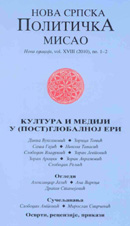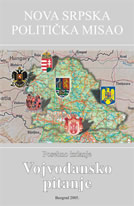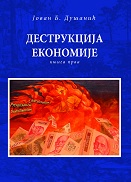| NSPM in English | |||
Will violence be rewarded again? |
 |
 |
 |
| utorak, 06. jul 2010. | |
|
Excellencies, Ladies and Gentlemen,
Serbs came in peace, yet they were met with unprovoked violence. Two high-intensity bombs were thrown into the crowd. They came from within courtyards of homes owned by ethnic Albanian supporters of the February 17th, 2008, unilateral declaration of independence. The facts that led to this flagrantact of terror—in which a dozen Serbs were seriously injured, and one local Bosniak Muslim, a pediatrician, was killed—are clear and indisputable. They are the direct result of the conscious choice made by provocateurs to expand the scope of the post-UDI, Pristina-based parallel institutions, to North Kosovo. I repeat: this was done deliberately in order to increase inter-ethnic tensions and sabotage the quest for comprehensive peace. It was yet another destructive consequence of a sinister plan—sponsored in part by the so-called International Civilian Office headed by Peter Feith—to unilaterally impose an illegal and unwanted regime in that part of our province. This was done not only against the will of the Kosovo Serbs, but despite the opposition of UNMIK, EULEX, and other responsible stakeholders, including the Security Council, which never approved the blueprint of UDI: the so-called Ahtisaari Proposal. It means that the secessionists continue to blatantly disregard international law, rejecting the UN Charter’s universal principles. This is absolutely unacceptable. We urge the international community to ensure nothing like what happened on Friday is ever repeated, and to make sure the illegal Office in North Mitrovica remains closed. We call on UNMIK to make use of its reserved powers under resolution 1244 (1999) and restore the province’s legitimate legal framework discarded by the secessionists. We call on the EU to compel EULEX to exercise its executive authority and swiftly bring to justice the perpetrators of all crimes against Kosovo Serbs—the most vulnerable local community in Europe. And we call on NATO to maintain its present troop levels and exclusive static presence at all Serbian holy sites they currently protect. Finally, we call on all responsible stakeholders to avoid ever again putting themselves in a position of supporting any additional destabilizing acts by Pristina. The ethnic Albanian authorities have to be told what the consequences will be—should they try unilateralism again. Otherwise, Serbia will have no choice but to reassess its relations with the international presence in the province. Excellencies, Attempts by Pristina to unilaterally impose any post-UDI institution on the local Serbian community—absent the consent of all stakeholders—will not be tolerated by Serbia: not an Office, not a Courthouse, not telecommunications infrastructure, and not any other act of aggression that is in violation of resolution 1244 (1999). On January 22nd, when I last addressed this Council, I harshly condemned the illegitimate strategy that has led us back to the Security Council today, underlining that it could only be forced upon the Serbian community in North Kosovo by a draconian, un-democratic set of measures. Those who announced and actively supported it—they and they alone—would have to bear sole responsibility for the de-stabilizing atmosphere such conflict-inciting designs would obviously produce. This is exactly what was attempted on Friday. I derive no satisfaction from this fact. It is incredibly disappointing that some in Pristina still believe in unilateralism—and that they believe it can ever provide an answer to any of the open issues we have an obligation to peacefully resolve. The bottom line is that the Security Council must not tolerate unilateralism. Opposing one-sidedness is its fundamental mission. So let me make myself clearly understood: differences on UDI notwithstanding, whoever does not condemn unilateralism of any sort in Kosovo—as Serbia has—will be responsible for any future violence, deaths, and acts of terror that may take place in the province. We must never forget that the circumstances that have led us to this point are rooted in the March 2004 pogrom planned and orchestrated by the authorities in Pristina. In less than 72 hours, thirty-five Serbian holy sites, many of them hundreds of years old, were set ablaze by tens of thousands of ethnic Albanian militants throughout Kosovo. Nineteen people were killed. Five hundred were injured. And more than five thousand Kosovo Serbs were ethnically cleansed from their homes. A profoundly terrible consequence arising from these atrocities committed against Kosovo Serbs was that it triggered the abandonment of the international community’s Standards Before Status approach. Pristina’s violent behavior was rewarded by some, and UDI was the result. What about today? Will violence be rewarded again? Will those who show a willingness to commit it gain further advantage? Is leverage in any discussions to come proportional to a readiness to engage in it? These are profound questions that we will have to urgently address, for how they are answered will contribute to determining whether the emerging norms of global governance will favor violence. This is not just about Kosovo; it is a litmus-test about how problems in the world will be tackled in the decades to come. “Only on a scrutiny of truth can a future of peace be built,” Secretary-General Dag Hammarskjöld said in 1960. The undeniable truth in this case is that the architects of the flagrant act of terror in North Mitrovica deserve the denunciation of this Council and the member States of the United Nations—for what happened on Friday illustrates the on-going, inherently dangerous consequences of UDI. The truth about UDI, however uncomfortable for some to hear, is that it cannot lead to peace and stability—for peace is the product of agreement, just as stability is the result of consensus. UDI rejected them both at the moment of its stillbirth. It has clearly divided the world and brought into question the fundamental tenets of the contemporary international system. That is why, in reality, the stubborn continuation of attempts to implement UDI can only produce what everyone responsible must seek to avoid: a long-term freezing of Kosovo’s limbo. Excellencies, It is our shared responsibility to find a way to overcome the present impasse. I want to be very clear on that. Unilateralism has gotten us nowhere. It is time to chart a course towards a secure future for all the residents of our southern province, for all the citizens of our country, and for all the nations of our region. The only way to establish stability in Kosovo is to implement in full the Secretary-General’s Six Points Plan which was—let me remind everyone—welcomed by this entire Council in November 2008, irrespective of member States’ differing positions on Pristina’s UDI. The Secretary-General’s Six Points Plan therefore contains the only legitimate framework for working out a number of delicate, practical issues—from the rule of law to guaranteeing lasting international protection for Serbian holy sites. It also comprises topics such as healthcare, education, telecommunications, and electricity—as well as privatization of socially-owned enterprises, property restitution, the return of more than 200,000 Kosovo Serb and Roma IDPs, and so on. No sensible impediment stands in the way of anyone sincerely engaging right away, through the Six Points Plan, in finding pragmatic arrangements that would benefit all the residents of the territory. Rapid breakthroughs in the domains covered by the Six Points Plan would help to build much-needed confidence between the parties. Our number one priority should be setting the stage for the peace process between Serbs and Albanians to begin in earnest, and for it to result in an agreement everyone can endorse. Excellencies, The significance of the landmark Kosovo case before the International Court of Justice must be re-stated in this chamber. It is, after all, the first time that the ICJ has been asked to consider the legality of a unilateral attempt to partition a UN member State in peacetime—in defiance of its Constitution and against the will of the Security Council. It is also the first time all five of its Permanent Members participated in a proceeding before the Court. A record number of countries presented their views, making it the largest case in history. Accordingly, the Court’s conclusions will have extensive consequences for the entire UN system. We have strong expectations that the Court will not legitimize Pristina’s UDI. Any other outcome would mean that no frontier—anywhere in the world—would remain safe from separatist ambitions. This would inevitably produce instability in all corners of the globe, as the number of ethnic conflicts multiplies. A substantial majority of UN member States—and of those seated on the Security Council—have continued to abide by their binding obligations under our 1945 Charter, and resolution 1244 (1999), to respect Serbia’s sovereignty and territorial integrity. On behalf of my nation, I would like to reiterate our deep gratitude for their support. We know that maintaining this position is not easy for everyone, because of the pressures that unfortunately continue to be exerted by those with the capacity to do so credibly. But we also know that tomorrow, some other country might find itself in a similar situation, and the world would rapidly discover that the rushing river let loose by Kosovo’s UDI has become an uncontrolled cascade of secession across the globe. That is why we strongly urge all non-recognizing member States to stay the course. Excellencies, The International Court of Justice will be reporting back to the UN General Assembly in the near future. Serbia will surely join the great many interested countries in the ensuing debate. One can reasonably predict that fundamental concerns about preserving basic international norms will compel the majority to encourage the parties to arrive at consensual solutions on all outstanding issues peacefully, through dialogue. But let us be frank with one another: there is no open question in Kosovo that is not related to status, directly or indirectly. It is impossible to think negotiations on anything can take place outside this context. We must not ignore this obvious reality, and waste an unprecedented chance for a mutually-acceptable, comprehensive settlement between Serbs and Albanians, to be found. I am aware of the fact that some powerful voices are against a consensual solution. But I remain profoundly puzzled as to why they would reject it out of hand. There is nothing to be lost by working together to reach a truly sustainable outcome. Moreover, it is absolutely clear that no democratic leadership in Serbia will ever, under any circumstances, implicitly or explicitly, recognize UDI. We have not consented to it, and we never will. This principled position is set in stone, and will not change—come what may. There are those who expect us to yield eventually. This will not happen. We will continue to use all diplomatic resources at the disposal of a sovereign state to oppose the unilateral attempt to partition our country. No peaceful, democratic and proud nation—whose territorial integrity is under threat—would act differently. I want to be very, very clear: we will pursue a compromise with Pristina constructively and in good faith, as if they had never attempted UDI. But make no mistake, my country is equally prepared to resist UDI incessantly, for as long as no compromise appears on the horizon. Excellencies, This past Friday’s tragedy reminds us of the fear and violence that stands at the foundation of unilateralism. But it can also teach us that the failure of one thing—UDI—can be repaired by the success of another: the establishment of a harmonious peace between two vibrant and proud nations—Serbs and Albanians. I close by saying that the time for anyone to try half-measures—devoid of real imagination or foresight—has come to an end. We have entered a period where only results matter—a period of consequence and momentous choice. We are determined to reach a sustainable agreement on the final status of Kosovo. We have no right to fail in this task. And we have no intention of humiliating anyone. What we seek is a just status that all parties can embrace. This is the only way to secure regional gains, reinforce shared priorities, and complete the democratic transformation of the Balkans. What everyone needs to do is reject the extremist voices who find comfort in the old ways, and who believe it is impossible for Serbs and Albanians to normalize their relations by reaching a historic compromise. This has been our vision all along—because we believe that comprehensive peace is essential for securing our shared, prosperous future in the European Union. Thank you for your attention. |
Ostali članci u rubrici
- Playing With Fire in Ukraine
- Kosovo as a res extra commercium and the alchemy of colonization
- The Balkans XX years after NATO aggression: the case of the Republic of Srpska – past, present and future
- Iz arhive - Remarks Before the Foreign Affairs Committee of the European Parliament
- Dysfunction in the Balkans - Can the Post-Yugoslav Settlement Survive?
- Serbia’s latest would-be savior is a modernizer, a strongman - or both
- Why the Ukraine Crisis Is the West’s Fault
- The Ghosts of World War I Circle over Ukraine
- Nato's action plan in Ukraine is right out of Dr Strangelove
- Why Yanukovych Said No to Europe

.jpg)























